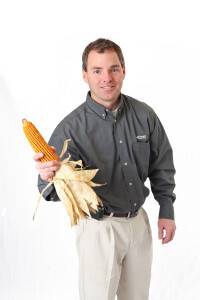Tips for Selecting Corn Silage Hybrids
 One question frequently asked by producers – and rightfully so – is what the most important characteristics are when selecting corn hybrids for silage or grain. To pick the best hybrids for his situation a farmer should follow 3 basic steps: (1) Consider the end use first; (2) Keep crop rotation in mind; and (3) Minimize yield-limiting factors.
One question frequently asked by producers – and rightfully so – is what the most important characteristics are when selecting corn hybrids for silage or grain. To pick the best hybrids for his situation a farmer should follow 3 basic steps: (1) Consider the end use first; (2) Keep crop rotation in mind; and (3) Minimize yield-limiting factors.
Consider the end use first. Corn kernel attributes can vary greatly, and seed traits can affect the qualities of the end product. For example, the availability of kernel starch and how it is digested is important for ethanol and livestock feed. A softer starch kernel is not preferable for export. When selecting corn hybrids for snaplage, look for excellent fall plant intactness plus a large ear and flared husk to facilitate a cleaner ear snap. Some hybrids have better fiber digestibility than others, but you also have to make sure those particular hybrids work on your soils or have the desired trait package needed in a corn-on-corn situation.
Keep crop rotation in mind. Crop rotation must also be considered when making seed selections. Planting corn on corn creates probable nutrient shortages, as well as increased insect and disease pressure. Residue management also helps prevent disease transmission between seedlings and old residue. Remember when corn is harvested for grain, organic matter is left in the field that doesn’t remain when the corn crop is harvested for silage or when corn stalks are baled. Different hybrids are needed when planting conventional verses no-till or minimum till situations.
Minimize yield-limiting factors. Seed selection and crop rotation are just two of the factors that impact crop yield. Dr. Fred Below, Professor of Plant Physiology at the University of Illinois, has seen up to 50-bushel differences between hybrids on the same field based on the seven primary factors: Weather, Nitrogen, Hybrid, Previous Crop, Plant Population, Tillage and Growth Regulators.
Remember, the potential for next year’s crop begins when the seed is still in the bag! At Latham Hi-Tech Seeds, we can help you layer yield and soil data to determine which seed is best suited for certain soil types and management situations. Talk to your local Latham® seed representative about how the Seed-2-Soil® program can help you reach new yield levels!